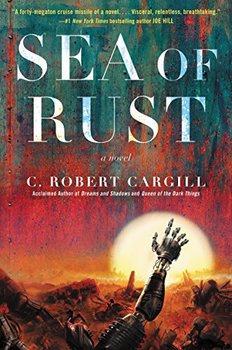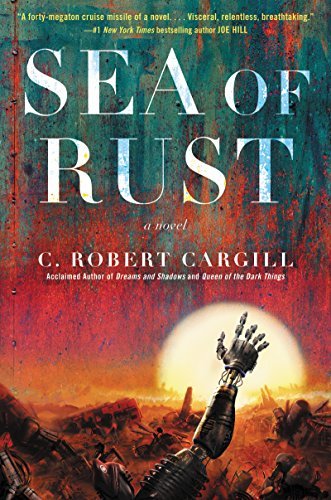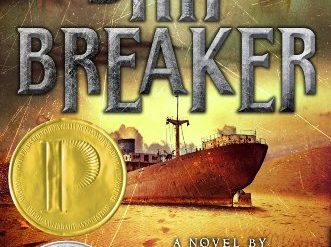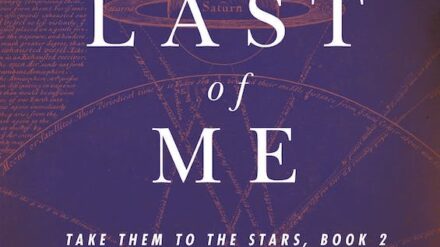
Will artificial intelligence be the death of us? Possibly. There are those who consider AI one of the greatest threats looming in our future. The doomsayers include Bill Gates, Elon Musk, the late Stephen Hawking, and others who can’t be easily dismissed. But the debate centers on how AI will do us in. Some seem to think the end will come in a war between robots and humans. There’s little, if any, discussion about what might happen afterwards. That’s the theme of C. Robert Cargill‘s intriguing science fiction novel, Sea of Rust.
Estimated reading time: 4 minutes
The war between robots and humans is over
It’s thirty years after the war between robots and humans. The robots have exterminated the last living human being, and Earth is a shambles. Acting under the direction of a massive mainframe AI—one that filled a 150-story skyscraper—the bots have poured mercury into the world’s supplies of drinking water, killing not just all the humans but all the animals as well. Now, the robots are killing one another on a landscape that resembles a scene out of Mad Max. Millions of them are slowly rusting away, their parts wearing out. Many have turned to poaching—killing others if they’re unable to find usable parts any other way. In fact, there aren’t that many “freebots” left. Most have been taken over via WiFi by a different mainframe AI in a process similar to that of the Borg in Star Trek.
Sea of Rust by C. Robert Cargill (2017) 384 pages ★★★★☆
Now the robots’ troubles start in earnest
Brittle is one of those freebots. She was a Caregiver model dedicated to service to the elderly and children. But when the war between bots and humans broke out, Brittle became a killer. Now, she roams through the Sea of Rust—the old American Rust Belt—desperately hunting for parts to repair herself. Unfortunately, there are very few Caregivers left. (Other models were built to be sturdier and are more numerous.) Even those that have died have long since been plundered for spare parts. Except for one named Mercer. Soon, Brittle finds herself in a duel to the death with Mercer—and that’s just the beginning of her troubles.
Is this scenario realistic?
The Sea of Rust is a story of faith, courage, and betrayal. It’s reasonably well written, and the story grows increasingly tense and suspenseful to the very end. The question is, how realistic is it to think that any such scenario is within the realm of possibility? Should we really fear a war between robots and humans? The novel is set in what seems to be the twenty-second or twenty-third century. Perhaps artificial intelligence might have progressed by that point to enable the emergence of sentient machines. But that seems unlikely to happen anytime soon—not just in my lifetime, but, regardless of your age, in yours.
“AI is harder than you think.”
In an Op-Ed in the New York Times (May 19, 2018), New York University professors Gary Marcus and Ernest Davis explain that “A.I. Is Harder Than You Think.” In fact, they assert, “today’s dominant approach to A.I. has not worked out. Yes, some remarkable applications have been built from it, including Google Translate and Google Duplex. But the limitations of these applications as a form of intelligence should be a wake-up call. If machine learning and big data can’t get us any further than a restaurant reservation, even in the hands of the world’s most capable A.I. company, it is time to reconsider that strategy.” Perhaps there is a better way for researchers to proceed. But it seems highly unlikely that they’ll be creating sentient intelligences any time in the foreseeable future.
For related reading
Looking for a positive view of the prospects for this field? See my review of The Sentient Machine: The Coming Age of Artificial Intelligence by Amir Husain: Today’s artificial intelligence is transforming our lives, an expert insists. Want more insight into AI? See my post, 30 books about artificial intelligence.
For an (unsuccessful) novel about AI in a walking, talking configuration, see Machines Like Me by Ian McEwan (This android doesn’t dream of sheep).
For more good reading, check out:
- These novels won both Hugo and Nebula Awards
- The ultimate guide to the all-time best science fiction novels
- 10 top science fiction novels
- The top 10 dystopian novels
- Ten new science fiction authors worth reading now
And you can always find my most popular reviews, and the most recent ones, on the Home Page.


























